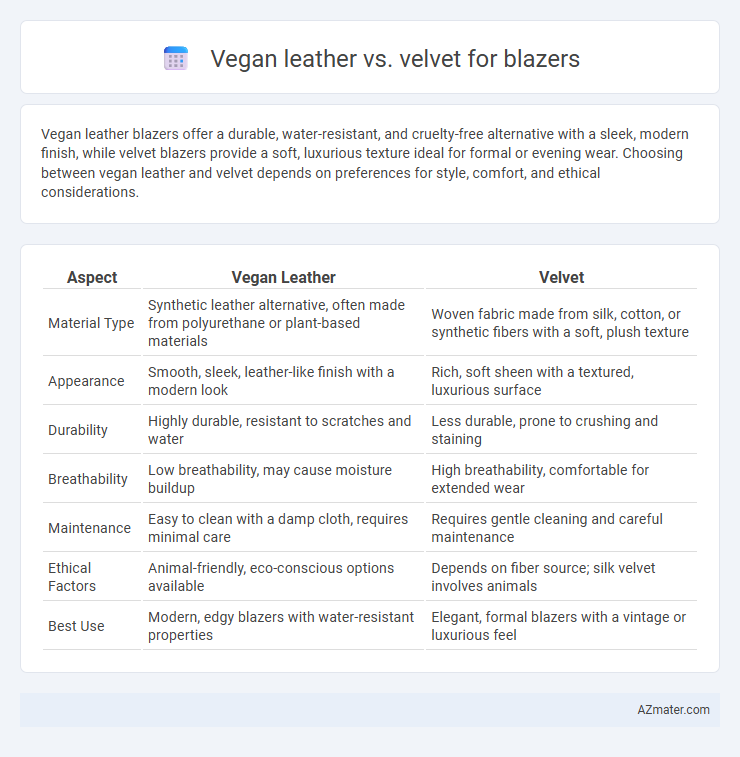Vegan leather blazers offer a durable, water-resistant, and cruelty-free alternative with a sleek, modern finish, while velvet blazers provide a soft, luxurious texture ideal for formal or evening wear. Choosing between vegan leather and velvet depends on preferences for style, comfort, and ethical considerations.
Table of Comparison
| Aspect | Vegan Leather | Velvet |
|---|---|---|
| Material Type | Synthetic leather alternative, often made from polyurethane or plant-based materials | Woven fabric made from silk, cotton, or synthetic fibers with a soft, plush texture |
| Appearance | Smooth, sleek, leather-like finish with a modern look | Rich, soft sheen with a textured, luxurious surface |
| Durability | Highly durable, resistant to scratches and water | Less durable, prone to crushing and staining |
| Breathability | Low breathability, may cause moisture buildup | High breathability, comfortable for extended wear |
| Maintenance | Easy to clean with a damp cloth, requires minimal care | Requires gentle cleaning and careful maintenance |
| Ethical Factors | Animal-friendly, eco-conscious options available | Depends on fiber source; silk velvet involves animals |
| Best Use | Modern, edgy blazers with water-resistant properties | Elegant, formal blazers with a vintage or luxurious feel |
Introduction to Vegan Leather and Velvet Blazers
Vegan leather blazers offer a cruelty-free alternative made from synthetic materials like polyurethane or innovative plant-based sources, providing a sleek, modern finish that mimics traditional leather's texture and durability. Velvet blazers, crafted from woven silk, cotton, or synthetic fibers, deliver a luxurious, soft texture with a distinct sheen, making them a popular choice for formal and evening wear. Both materials cater to different style preferences and occasions, with vegan leather emphasizing sustainability and edge, while velvet prioritizes elegance and richness in appearance.
Material Composition: Vegan Leather vs Velvet
Vegan leather for blazers is typically made from polyurethane or plant-based materials like pineapple leaf fibers, offering a durable, water-resistant, and animal-friendly alternative to traditional leather. Velvet, composed of woven tufted fabric usually made from silk, cotton, or synthetic fibers, provides a soft texture with a luxurious appearance but requires more delicate care due to its pile weave. The choice between vegan leather and velvet depends on the desired balance of durability, texture, and ethical material sourcing in blazer construction.
Sustainability and Environmental Impact
Vegan leather blazers offer a more sustainable alternative to traditional leather by reducing animal cruelty and minimizing greenhouse gas emissions associated with livestock farming. Velvet blazers, depending on the fiber composition, can have varying environmental impacts; natural fibers like organic cotton velvet reduce chemical use and water consumption compared to synthetic velvet made from petroleum-based materials. Choosing vegan leather made from biodegradable or recycled materials enhances sustainability, while opting for velvet produced through eco-friendly processes supports lower carbon footprints in fashion.
Comfort and Wearability Comparison
Vegan leather blazers offer a sleek, water-resistant finish but can feel less breathable and stiffer compared to velvet, which provides superior softness and warmth ideal for extended wear. Velvet blazers excel in comfort due to their plush texture and natural breathability, making them suitable for cooler climates and formal events. Wearability favors velvet in terms of flexibility and ease of movement, while vegan leather requires careful maintenance to avoid cracking and may feel less comfortable during prolonged use.
Style and Aesthetic Options
Vegan leather blazers offer a sleek, modern aesthetic with a polished finish that enhances structured silhouettes and adds an edgy, contemporary vibe to outfits. Velvet blazers exude luxury and softness, providing rich texture and depth ideal for formal occasions or evening wear, with a variety of colors that amplify elegance. Both materials cater to distinct style preferences, with vegan leather emphasizing bold sophistication and velvet delivering classic opulence.
Durability and Maintenance
Vegan leather blazers offer superior durability due to their resistance to water and stains, making them easier to maintain with simple cleaning methods such as wiping with a damp cloth. Velvet blazers require more delicate care, including dry cleaning, to preserve their texture and prevent damage from moisture or friction. For long-lasting wear, vegan leather is more resilient, while velvet demands careful handling to maintain its luxurious appearance.
Price Differences and Accessibility
Vegan leather blazers generally come at a higher price point due to the cost of synthetic materials and ethical production processes, while velvet blazers are often more affordable and widely available in diverse retail settings. Accessibility of vegan leather varies by market, commonly found in specialty and eco-conscious stores, whereas velvet blazers benefit from mainstream availability in both high-street and luxury fashion outlets. The price differences reflect the material sourcing and manufacturing complexities, influencing consumer choice based on budget and sustainability priorities.
Seasonal Suitability for Each Material
Vegan leather blazers provide excellent durability and water resistance, making them ideal for fall and winter seasons when warmth and weather protection are essential. Velvet blazers offer a plush, insulating texture suited for cooler months but excel in formal or evening occasions due to their luxurious appearance. Both materials fall short in breathability, thus less suitable for hot summer conditions.
Ethical Considerations in Fashion Choices
Vegan leather offers a cruelty-free alternative to traditional leather, aligning with ethical fashion by reducing animal harm and minimizing environmental impact through the use of sustainable materials. Velvet, typically made from synthetic fibers or natural silk, carries ethical considerations related to resource-intensive production and animal welfare when silk is involved. Choosing between vegan leather and velvet for a blazer involves weighing animal rights, environmental sustainability, and manufacturing practices to support responsible fashion consumption.
Final Verdict: Which Blazer Material Wins?
Vegan leather blazers offer a sleek, modern look with durability and water resistance, making them ideal for edgy, contemporary styles and easy maintenance. Velvet blazers provide a luxurious texture and rich appearance, perfect for formal occasions and adding depth to an outfit but require more delicate care. The final verdict depends on your lifestyle: choose vegan leather for versatility and practicality or velvet for elegance and classic sophistication.

Infographic: Vegan leather vs Velvet for Blazer
 azmater.com
azmater.com